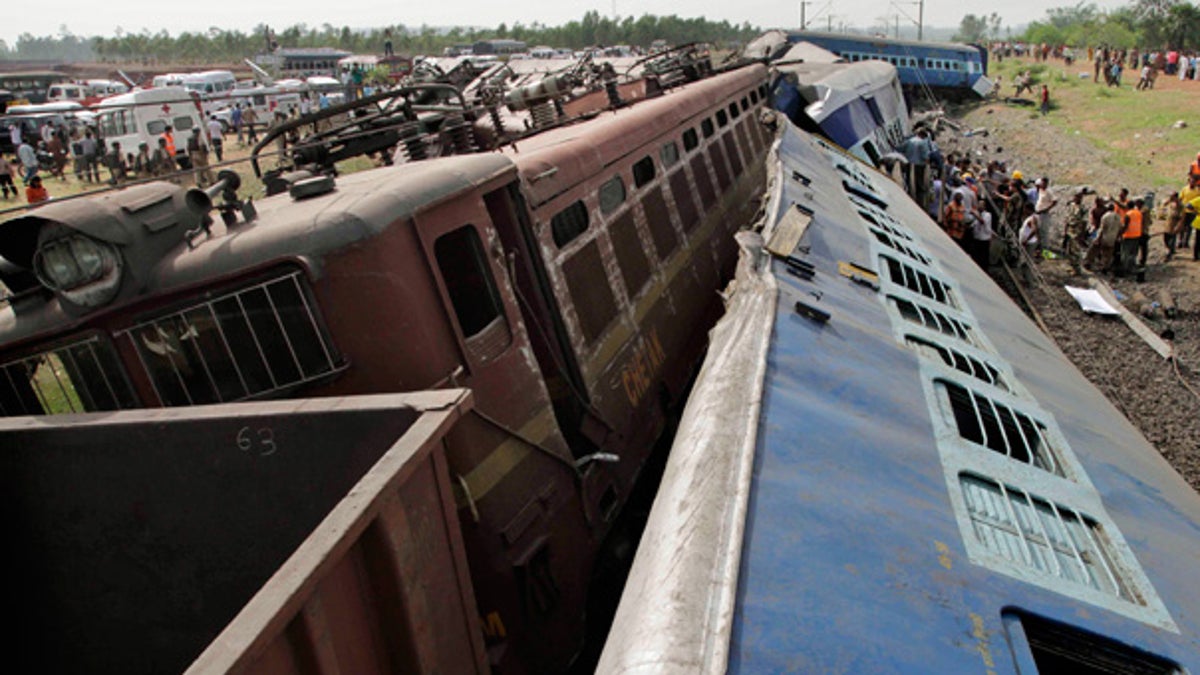
May 28: India rescue workers and police gather at the scene of a train crash near Sardiha, India. (AP2010)
SARDIHA, India – SARDIHA, India (AP) — Rescuers scoured the wreckage of a passenger express train Friday that derailed and collided with a cargo train in eastern India, killing at least 71 people and injuring hundreds. The government accused Maoist rebels of sabotaging the tracks.
As night fell, railway workers and paramilitary soldiers were using two cranes to lift and pry apart train cars in search of survivors from the Jnaneswari Express, which was heading from Calcutta to suburban Mumbai when it derailed about 1:30 a.m. Friday.
Railway officials said they expected the death toll to rise because bodies were still trapped between the engines of the two trains, which collided along a rural stretch of track near the small town of Sardiha, about 90 miles (150 kilometers) west of Calcutta in West Bengal state.
The area is a stronghold of India's Maoist rebels, known as Naxalites, who had called for a four-day general strike in the area starting Friday. The Naxalites have launched repeated and often-audacious attacks in recent months — despite government claims that it was launching its own crackdown.
Just 11 days ago, the rebels ambushed a bus in central India, killing 31 police officers and civilians. A few weeks before that, 76 soldiers were killed in a rebel ambush — the deadliest attack by the rebels against government forces in the 43-year insurgency. There also have been dozens of smaller attacks.
On Friday, the government vowed once again to crush the Naxalites.
"The Maoists have done this work," West Bengal Chief Minister Buddhadeb Bhattacharjee told reporters in Calcutta. "All-out efforts will be made to free the state and the country from this danger."
But analysts say the government is hobbled by vacillating policies, poorly trained and ill-armed security forces and vast tracts of India where the government has little influence and where poverty has brought considerable support to the Naxalites, who claim to be fighting on behalf of the rural poor.
The rebels, who have tapped into the poor's anger at being left out of the country's economic gains, are now present in 20 of the country's 28 states and have an estimated 10,000 to 20,000 fighters, according to the Home Ministry.
"There is an absence of government, there is an absence of competence in government, there is an absence of coherence in response," said Ajai Sahni, a New Delhi-based analyst with close ties to India's security establishment. "The purpose of the Maoists is not to resolve grievances but to harvest them, and there are numerous grievances in the country to harvest."
In Sardiha, officials said the train tracks had been sabotaged but disagreed about exactly what had happened, with some saying it was caused by an explosion but others blaming cut rail lines.
Bhupinder Singh, the top police official in West Bengal, said posters from the People's Committee Against Police Atrocities, a group local officials believe is closely tied to the Maoists, had been found at the scene taking responsibility for the attack.
However, a spokesman for the group, Asit Mahato, denied any role, the Press Trust of India news agency reported.
The Maoists seldom claim credit for their attacks.
Survivors described a night of screaming and chaos after the derailment, and said it took rescuers more than three hours to reach the scene, where the blue passenger train and red cargo train were knotted together in mangled metal.
Sher Ali, a 25-year-old Mumbai factory worker, was traveling with his wife, two children and his brother's family when they were jerked awake by a loud thud. A moment later, their car was tossed from the track, he said.
"My sister-in-law was crushed when the coach overturned. We saw her dying, but we couldn't do anything to help her," said Ali, who had cuts on his head and arms. The rest of the family survived, though a 10-year-old nephew was badly injured and hospitalized.
Ali was unable to go to the hospital, though, because all his money was in his luggage inside the wreckage and he was afraid it would be stolen unless he kept watch.
Soumitra Majumdar, a railway spokesman said 71 people were confirmed dead and nearly 200 people were injured.
Railway Minister Mamata Banerjee said the Saridha area had been the scene of earlier Naxalite attacks, and that trains were under orders to travel slowly through the region — in part so the drivers can keep watch for sabotaged tracks or bombs, and in part so the effects of a crash are lessened if a train does derail.
___
Associated Press writers Tim Sullivan, Ashok Sharma and Muneeza Naqvi contributed to this report from New Delhi.
